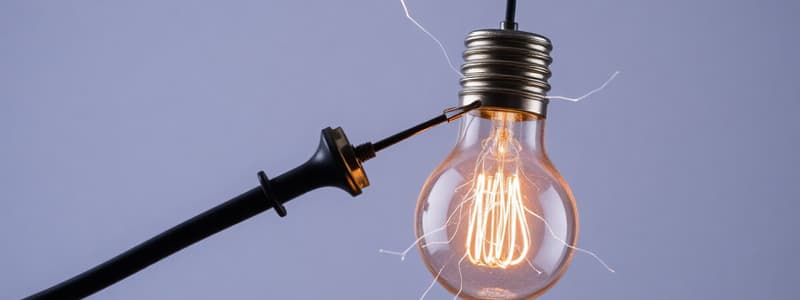Podcast
Questions and Answers
Why do we need electricity?
Why do we need electricity?
Electricity is essential for lighting, powering appliances, transport and communication systems. Without electricity, life would be very different.
What is electricity?
What is electricity?
Electricity is the flow of charged particles. Charged particles include positive protons and negative electrons. An electric current is the flow of electrons around a circuit.
What makes a metal a good electrical conductor?
What makes a metal a good electrical conductor?
All materials contain electrons (negatively charged particles). In materials made of metal, the electrons are free to move and carry the electrical charge. This makes them good electrical conductors.
Name a material which is an electrical insulator.
Name a material which is an electrical insulator.
What is static electricity?
What is static electricity?
Name something powered by electricity.
Name something powered by electricity.
Flashcards
Electricity
Electricity
The flow of charged particles, including protons and electrons, creating an electric current.
Electrical Conductor
Electrical Conductor
A material that allows electrons to flow easily.
Electrical Insulator
Electrical Insulator
A material that prevents the flow of electrons.
Static Electricity
Static Electricity
Signup and view all the flashcards
Electric Current
Electric Current
Signup and view all the flashcards
Electric Circuit
Electric Circuit
Signup and view all the flashcards
Electron
Electron
Signup and view all the flashcards
Proton
Proton
Signup and view all the flashcards
Charged particles
Charged particles
Signup and view all the flashcards
Uses of Electricity
Uses of Electricity
Signup and view all the flashcards
Example of a Conductor
Example of a Conductor
Signup and view all the flashcards
Example of an Insulator
Example of an Insulator
Signup and view all the flashcards
Why Metals are Conductors?
Why Metals are Conductors?
Signup and view all the flashcards
How Static Electricity Works
How Static Electricity Works
Signup and view all the flashcards
Example of Electrical Device
Example of Electrical Device
Signup and view all the flashcards
Electrical appliances
Electrical appliances
Signup and view all the flashcards
Life without electricity
Life without electricity
Signup and view all the flashcards
What is a simple way to remember conductors?
What is a simple way to remember conductors?
Signup and view all the flashcards
What is a simple way to remember insulators?
What is a simple way to remember insulators?
Signup and view all the flashcards
Analogy for electric current
Analogy for electric current
Signup and view all the flashcards
Study Notes
Why We Need Electricity
- Electricity is essential for lighting, powering appliances, transportation, and communication systems.
- Without electricity, life would be very different.
What is Electricity?
- Electricity is the flow of charged particles.
- Charged particles include positive protons and negative electrons.
- An electric current is the flow of electrons around a circuit.
Electrical Conductors
- All materials contain electrons (negatively charged particles).
- In metal materials, electrons are free to move and carry electrical charge.
- This makes metals good electrical conductors.
Electrical Insulators
- Most non-metal materials (e.g., rubber, plastic) cannot conduct electricity.
- Electrons in these materials are not free to move, so they cannot carry an electrical charge.
- This makes them good electrical insulators.
Static Electricity
- When a balloon is rubbed on a jumper, electrons move from the jumper to the balloon.
- This creates a negative charge on the balloon.
- This build-up of electrical charge is called static electricity.
- If you touch the balloon, you may get an electric shock, as the electrical charge travels through you to the ground.
Quick Quiz Questions
- Name something powered by electricity.
- What is electricity?
- What makes a metal a good electrical conductor?
- Name a material that is an electrical insulator.
- What is static electricity?
Quick Quiz Answers
- Lights, appliances, and communication systems.
- The flow of charged particles.
- Electrons are free to move and carry an electrical charge.
- Wood, plastic, or rubber.
- The buildup of electrical charge.
Studying That Suits You
Use AI to generate personalized quizzes and flashcards to suit your learning preferences.
Related Documents
Description
Explore the fundamental concepts of electricity, including its importance, the nature of electrical current, and the difference between conductors and insulators. This quiz also touches on static electricity to give a comprehensive overview of how electricity works in our daily lives.




